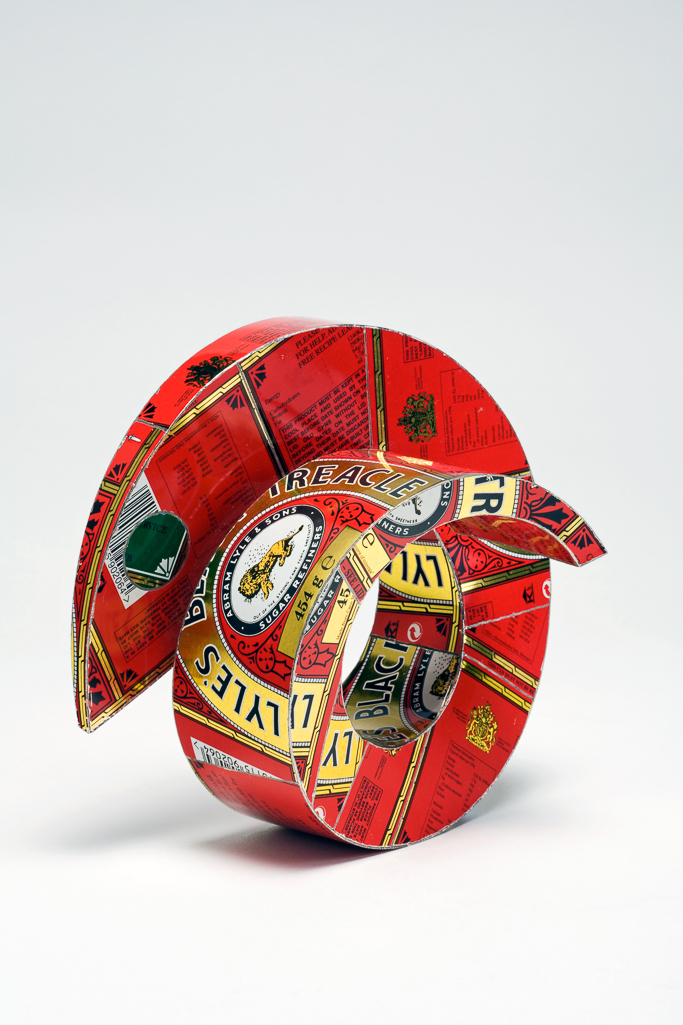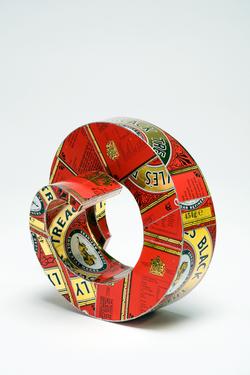Current Location: In storage
Titles
Well, Well, Well
Maker(s)
Maker:
Poston, David
Entities
Categories
Description
Recycled painted tin (Tate & Lyle Black Treacle and Golden Syrup tins) welded over a wooden core, finished with ‘A Glaze’ automotive polymer. The colours are red, black and gold
Notes
History note: Exhibited at Origin, held at Somerset House, London, week 1, 7-12 October 2008, where purchased from David Poston by the donors
Legal notes
Gift of Nicholas and Judith Goodison through The Art Fund
Measurements and weight
Diameter: 15.5 cm
Diameter: 16 cm
Height: 9 cm
Weight: 370 gm
Acquisition and important dates
Method of acquisition: Given
(2008-11-24)
by
Goodison, Nicholas and Judith
Dating
21st Century, Early
Elizabeth II
Production date:
AD 2008
Note
Text from object entry in A. Game (2016) ‘Contemporary British Crafts: The Goodison Gift to the Fitzwilliam Museum’. London: Philip Wilson Publishers: David Poston studied Jewellery at Hornsey College of Art. He established an independent studio in 1970, creating work across a range of materials whilst also working as a documentary photographer in the field of music, creating images of bands as varied as Fairport Convention and the Rolling Stones. In 1984, he used his creative and technical skills in new contexts, working in international development in rural Africa for clients including the World Bank, Oxfam and the UN. Following a period of teaching at Loughborough University, he returned to full-time practice in 2000 and was (2015–16) the subject of a major UK touring show of jewellery, titled Necklace for an Elephant and Other Stories which was shown at The Fitzwilliam Museum in summer 2015. David Poston: ‘The form of the bangle makes reference to a beautiful red-brick ziggurat that is, or possibly now post-war was, in Iraq. The painted tin sheath was welded over a wooden core that I had carved as a single piece. However, in order to be able to weld the seams which pass very close to one another the carved core had to be cut in two so that each end could be sheathed. The wooden halves were then rejoined and the remaining central part sheathed, hiding the join.’ A life history interview with David Poston is available at http://sounds.bl.uk/Oral-history/Crafts
School or Style
Contemporary Craft
Components of the work
Surface
composed of
steel
( Tate & Lyle Black Treacle and Golden syrup tins)
A Glaze automotive polymer
Core
composed of
wood
Steel
Wood
References and bibliographic entries
Related exhibitions
Identification numbers
Accession number: M.6-2008
Primary reference Number: 166431
Entry form number: 1002
Stable URI
Audit data
Created: Saturday 6 August 2011
Updated: Friday 21 March 2025
Last processed: Tuesday 13 May 2025
Associated departments & institutions
Owner or interested party:
The Fitzwilliam Museum
Associated department:
Applied Arts





